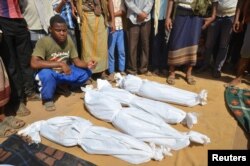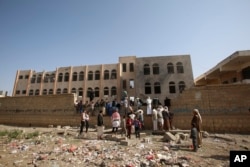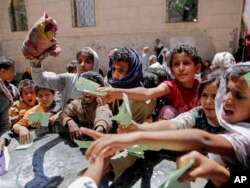Two children’s rights groups are calling for the U.N. secretary-general to put Saudi Arabia on a U.N. blacklist of countries that violate children’s rights, for its military actions in Yemen.
Watchlist on Children and Armed Conflict, and Save the Children, issued the appeal Thursday at the launch of a new joint report on how the destruction of Yemen’s health care infrastructure is harming children in that country.
“In Yemen, medical facilities and personnel are being systematically attacked as a tactic of war, preventing children’s access to health care,” said Christine Monaghan researcher for Watchlist and the author of the report.
Citing Red Cross statistics, the advocacy groups say the warring parties are responsible for at least 160 attacks on medical facilities and personnel over the last two years.
The attacks have led to the destruction of an already weak health care system, and children, already among the most vulnerable, are suffering severely as a result.
“Eight-point-one million children lack access to basic health care -- an increase of more than 70 percent over the past few years,” Monaghan said. “Children are dying of preventable diseases, including malnutrition, diarrhea and respiratory infections.”
According to the U.N. Children’s agency, UNICEF, a child in Yemen dies every 10 minutes from a preventable disease.
Not the First Time
Last July, then-U.N. Secretary General Ban Ki-moon included the Saudi Arabian-led coalition on the annual blacklist as one of the parties that kills and maims children and engages in attacks on schools and hospitals. He later removed them, citing “undue pressure” from the oil-rich nation and threats of defunding of lifesaving U.N. programs.
The Saudis denied ever having pressured the U.N. chief to remove them from the list.
“The Saudi Arabian-led coalition and the Houthis - and each party’s respective allies - are denying sustained humanitarian access and are directly attacking hospitals and clinics,” Monaghan told reporters.
Already one of the Arab world’s poorest countries when Iranian-backed Houthi rebels tried to seize power from the internationally recognized president, Abdu Rabu Mansour Hadi, in September 2014, Yemen has been subjected to a two-year Saudi-led aerial campaign to restore Hadi to power. Since then, the U.N. says thousands of civilians have been killed and injured and more than 3 million displaced from their homes. Nearly 19 million Yemenis are in need of humanitarian assistance, but a U.N. appeal for more than $2 billion is only 6 percent funded.
Today, the country is on the brink of famine as humanitarian organizations have limited access, food prices have surged, and a Saudi-imposed air and sea blockade has hindered food deliveries to a country that pre-conflict imported 90 percent of its food stocks.
The U.N. has classified Yemen as a level three emergency – Syria and Iraq are the only other two humanitarian crises rated this severe.
Recommendations
The advocacy groups are calling on Secretary-General António Guterres to put the Saudis on the U.N. blacklist for violating children’s rights when it is published later this year.
They also are calling for all parties to immediately cease attacks on medical facilities and personnel; allow humanitarian workers safe and unhindered access; and for both sides to sign action plans with the U.N. to stop and prevent attacks on medical facilities.
To the Saudi-led coalition, the groups are urging an immediate end to the air and sea blockade and the reopening of commercial airspace over Yemen.
They also are urging the U.N. Security Council to sanction parties responsible for grave violations against children and attacks on hospitals, and to develop a mechanism to ensure accountability.







